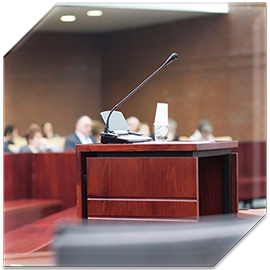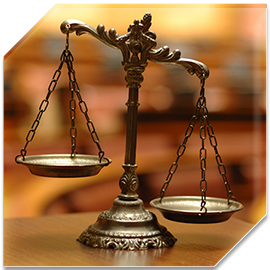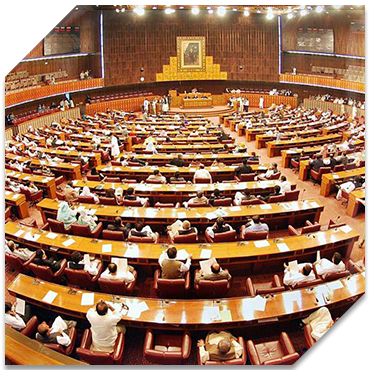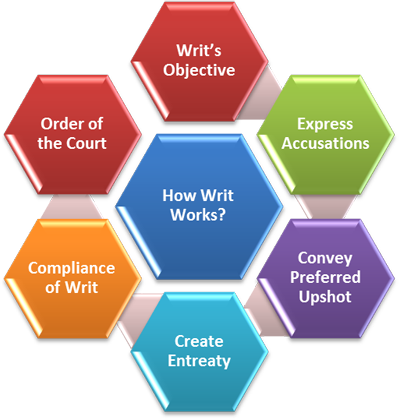ZAFAR & ASSOCIATES - LLP | Constitutional Law Services - Pakistan

Administrative Law
Administrative & Authoritative LawAdministrative law encompasses legal principles governing the administration of authorities.

Appellate Practice
Appellate Tribunal & OmbudsmanAppellate practice consists of the rules and practices by which appellate courts review trial court judgments.

Expert Witnesses
Expert Witnesses & PresentationExpert witnesses are persons whose opinion by virtue of education, training, certification, skills or experience.

Litigation Practice
Constitutional LitigationLitigation practice includes any interactions between disputing parties prior to proceedings being commenced.
Constitutional Law Practice in Pakistan

Constitutional law is a body of law which defines the role, powers, and structure of distinct organizational units within a governmental setup, namely, the executive, the parliament or legislature, and the judiciary; as well as the basic rights of citizens.
Constitution is not an ordinary statute made in ordinary legal procedure. It is the creation of a Constitutional Act and therefore the sanctity of a Constitution is much higher than any statute made by the legislature. A Statute is an act to fulfill a particular social, political or economic need and so its efficacy of importance does not endure so long. But a Constitution is made to endure with the avowed purpose to fulfill the aspiration of the people who made it. It is by the people, for the people and a documentation of the cherished good of the people.
Constitutions are not conceived and acted in vacuum, and as an instrument of Government. It is always intended the condition and as it is itself conditioned by the circumstance and environment of the community whose activities seek it to regulate. It is never internal and differs from other laws only in respect of general national purpose, it has in view. Constitution, written - unwritten has a philosophy of its own: it is the means of ordering the life of people. This way we should have good understanding of our constitution.
One reason why the law of constitution is imperfectly understood is that we rarely put it side by side with the constitutional provisions of other countries. In other words a comparative study of the constitution is absolutely necessary for its perfect understanding. Apart from it we should also study to find out that what was in the mind of constitution makers.
Constitutional interpretations by Courts have played an important role in settling political problems as well as other issues involving individuals and parties. These interpretations have also restricted or expanded the scope of action of different functionaries of the Government and enabled individuals and groups to enjoy constitutional and legal protection. The Supreme Court of America, in a case held that an unconstitutional act is not a law, it confers no rights, it imposes no duties, it creates no offence and this act is inoperative as it has never been passed. The Superior Courts in Pakistan also support this viewpoint. In all matters, aggrieved person can avail the statutory remedy of Appeal or Revision, which is not some times adequate, effective, efficacious, convenient, beneficiary and expeditious. In such situations the aggrieved party can avail the extra ordinary remedy by invoking constitutional jurisdiction of the High Court or Supreme Court, which is obviously speedy and effective remedy and foster the justice. These conditions occasionally overlap or conflict with each other.
Law of Writs in Pakistan
A writ is an official written directive issued by an organisation with administrative or judicial jurisdiction; in modern sense, this organisation is known as a court. There are many types of writs exist including prerogative writs, summons and warrants but there are many others.
The writ, in common parlance, is an order issued by a court in the name of an authority requiring the performance of a specific act.
Prerogative Writs
The "prerogative" writs or writs based on privileges are a subclass of the group of writs, those that are to be heard before regular cases on a court's docket except other such writs. The most common types of prerogative writs are mandamus, certiorari, habeas corpus, procedendo, prohibito, and quo warranto, although these technical names have not been prescribed in the constitution.
Writ of Mandamus
Mandamus is a judicial remedy which is in the form of an order from a superior court to any subordinate court, organisational or public authority to do or refrain from doing some specific act which that body is obliged under the law to do or abstain from doing, as the case may be, and which is in the nature of public duty and in certain cases of a statutory duty. It cannot be issued to force an authority to do something against any statutory law.
Writ of Certiorari
Certiorari is a writ intending for seeking judicial review, currently means an order by a superior court directing a lower court, tribunal, or public authority to submit the record in a certain case for review.
Writ of Habeas Corpus
Habeas corpus is a legal action through which a prisoner can be released from an unlawful custody or detention. The remedy can be pursued by the prisoner or by another person coming to his / her assistance. Habeas corpus originated in the English legal system, has historically been an important legal mechanism, protecting rights of individual against arbitrary governmental action.
Writ of Procedendo
A writ of procedendo is a remedy where there is a delay in rendering a judgment that amount to a abandonment or denial of justice. It is an order of a higher court to lower court, directing that court to extract a delayed judgment. The writ does not specify as to what judgment the lower court must extract, it merely orders the lower court to proceed to judgment. Rebuttal to comply with the writ may subject the lower court to an excerpt for contempt.
Writ of Prohibito
The Court may issue a writ of prohibition to prohibit the authority from acting in excess of its jurisdiction. This writ is normally issued by a superior court to the lower court asking it not to proceed with a case which does not fall under its jurisdiction.
Writ of Quo Warranto
The writ of quo warranto is issued against a person who claims or usurps a public office. Through this process, the court inquires 'by what authority' the person supports his or her claim.
Other writs
Other writs include audita querela, capias, coram nobis, fieri facias, mittimus, ne exeat republica, praemuire, scire facias, frrts and venire facias etc.

Writ Petition Process
A writ petition is a request made by an individual, aggrieved by a court order to receive expedited attention in a court of appeals. An individual who wishes to file a writ petition must first determine if his / her case can be appealed. It's important to remember that all courts will have different requirements dependent on location of court and type of court. You should always pursue a legal counsel when considering a writ petition. These steps will help you to determine the petition-status of your appeal and understand the writ petition process.
Writ's Objective
Writ petitions are filed when a petitioner believes that the court has made an error that adversely affected the outcome of their case. You must be able to eloquent the nature of this error and measure its legal stance. If your case concerns an issue of extensive interest or raises an original issue about the law, then you may have grounds for filing a writ of petition. Moreover, if a court ruling could cause you an unintended harm, then you may have an option.
Express Accusations
While every writ petition procedure will differ, each will require you to eloquent the nature of your case and provide an originated reason for expedited appeal. A writ begins with an accusation against a court in which you must briefly state the facts related to your trial. You might highlight key evidence presented in your favour or pinpoint the instant at which you feel the court erred.
Convey Preferred Upshot
The second stage of a writ procedure will require you to tell the court as how you want the court to reconcile its error. Generally; petitioners do this in order of importance, starting with a petition for the court to rehear the case and ending with a request for the court to refund all fees related to the appeal.
Create Entreaty
The third and final part of the procedure is the creation of entreaty, in which you call the court's attention to your statement of fact along with supportive arguments. You must also prove that you have no other solution beyond a writ petition and that you need speedy and justifiable consideration of the writ.
Compliance of Writ
Once you've consulted legal counsel and prepared your writ petition, you can submit it to the court for consideration. All courts have different deadlines for filing a petition so it's important that you check with your local court to make sure you've filed it in time.
Order of the Court
After considering the facts and figures as narrated inside the writ petition, court will issue an order accordingly.
Jurisdiction of Courts
These writs are issued by the High Courts under Art. 199 of the Constitution of Islamic Republic of Pakistan and by the Supreme Court under Art. 184 of the Constitution. The sole object of Art. 184 is for enforcement of the fundamental rights conferred in Part-2, Chapter 1, of the Constitution. No petition can lie before the Supreme Court unless there is infringement of fundamental right. The High Court can interfere, if the action is mala fide or arbitrary or does not confirm to the statutory requirement, or the order is patently erroneous.
Although the writ jurisdiction conferred upon the High Court is discretionary but this right is not a privilege and is a very valuable right conferred on a citizen. Art. 77 of the Constitution provides that no tax shall be levied or collected except by the authority of law and Art. 18 allows free trade, business or profession throughout Pakistan. Any provision of a specific law cannot override Art. 184 / 199 of the Constitution.
Writs are issued by the High Courts under Art. 199 of the Constitution for the enforcement of fundamental rights, for the redress of any other provision of the constitution or any provision of any statute, Ordinance, Order, Rule or Regulation or illegality by any authority. No writ petition can be entertained if any other statutory remedy for such redress is available but where the defect of jurisdiction is apparent on the face of the proceedings, or there is abuse of discretionary power, a writ will be issued despite of the existence of alternate remedy. There is plethora of judgments of Superior Courts which differentiate the circumstances under which these courts should have entertained a writ. Aggrieved persons can contact us for availing this remedy under the Constitution.
The subject of constitutional law is gradually assuming importance in our country due to its relevance to community problems and issues. The issues such as the protection of individual rights and freedoms, the composition and functions of governmental institutions, the powers and functions of State functionaries, etc., are issues of common interest and concern. The study of constitutional law is, thus a matter of increasing interest, not just for the professionals in the legal field, but also to common citizens. A class of this kind at ZA-LLP, therefore, very useful in creating awareness among the people about legal and constitutional issues and leads to better understanding of the evolving legal concepts and principles, thereby paving the way for constitutional rule, observance of rule of law and better governance in the society.
“The Constitution of a country, is not merely a lawyer’s document, but is in fact the vehicle of nation’s life.” It is, thus a politico-legal document and is a revelation of the great purposes which with the legislative, executive and judicial limbs of the State and demarcates their respective spheres of operation. It defines the relationship between a Federation and the Provinces comprised within it. It deals with the fundamental rights and duties of the citizens of the Country. Thus, according to H.L.A. Hart, the Constitution prescribes the paramount norms whereas the law prescribes norms which are in turn derived from the paramount norms.
Our Core Competencies
Collaborative Skillset
Collaborative lawyers trust the wisdom of the group; lone wolves and isolationists do not do any good anymore.
Emotional Intelligence
Distant, detached lawyers are relics of the 20th century, the market no longer wants a lawyer who is only half a person.
Technological Affinity
If you can not effectively and efficiently use e-communications, and mobile tech, you might as well just stay home.
Time Management
Virtually a substantial part of lawyers difficulties in this regard lie with their inability to prioritise their time.

